Woman Rethinks Future With Her Fiancé After Fighting About Rehoming His Dog, Which Revealed Just How Incompatible They Are
Have you ever realized how incompatible some couples are after reading one post detailing their relationship? That was my only thought after reading a Reddit post about a couple and their fight over a dog.
OP made it very clear that she is not a fan of her fiancé's 3-year-old dog. He had the dog for more than a year before he and OP started dating.
She said that while the dog is sweet, he is unruly and energetic. The dog barks excessively, pees when he's excited, and chews any furniture he can find whenever he's bored.
The dog is also untrained and only follows the command "sit" from time to time. OP has learned to tolerate the dog, but she's not sure how he fits into the next phase of their lives.
OP's real problem, however, is not her fiancé's dog — it's her fiancé. He graduated over eight months ago, but he hasn't had any luck landing a job.
They are hoping to move in together when OP graduates soon, but that is obviously impossible if he can't get a job. He recently got a job interview at one of the companies in OP's town, and OP thinks it's perfect for him.
If he does get the job, OP's parents have agreed to let him live at their house until OP graduates and they can afford a place of their own

They are not willing to have him move in with the dog, and that's the problem
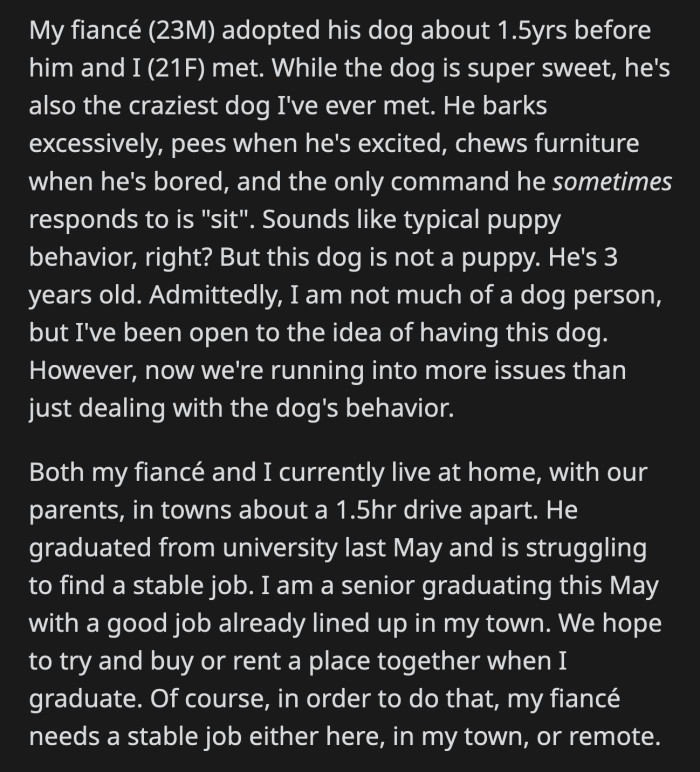
His parents can't take the dog because of their health
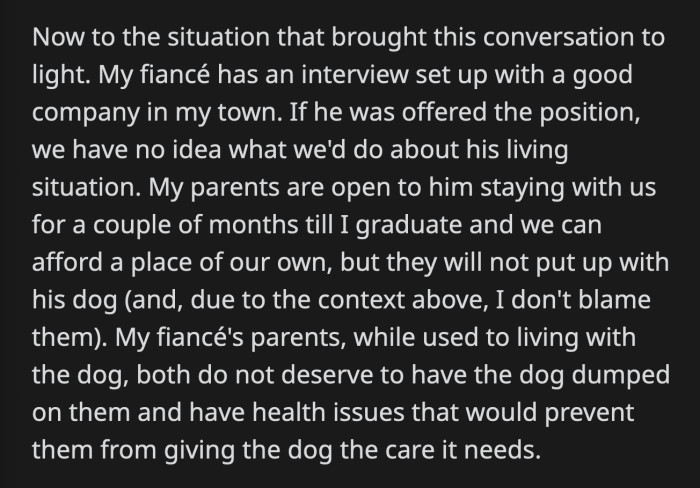
Understanding Relationship Dynamics Through Conflict
The conflict surrounding the rehoming of a pet is often indicative of deeper relational incompatibilities. Research in relationship psychology highlights that disagreements about pets can mirror broader issues of commitment and values alignment within a partnership. For instance, a study published in the Journal of Marriage and Family indicates that couples who experience significant disagreements about pets often face underlying challenges in their communication styles and conflict resolution approaches.
Such conflicts can serve as critical stress tests for the relationship, revealing fundamental differences in priorities and emotional investments.
Rehoming Pets: A Reflection of Relationship Dynamics
The conflict surrounding the rehoming of a pet often serves as a microcosm of larger relationship dynamics. According to Dr. Sue Johnson, a leading expert in attachment theory, the emotional responses we have towards pets can mirror our attachments in human relationships. The struggle over a pet can reveal underlying incompatibilities regarding values, responsibilities, and emotional support systems within the partnership.
In this case, the issue of a dog’s future may indicate broader concerns regarding commitment and shared responsibilities in the relationship. Research shows that when partners are misaligned in their values, it can lead to significant conflict.
So... OP brought up rehoming the dog because, as she said, her fiancé cannot afford to turn down this job opportunity
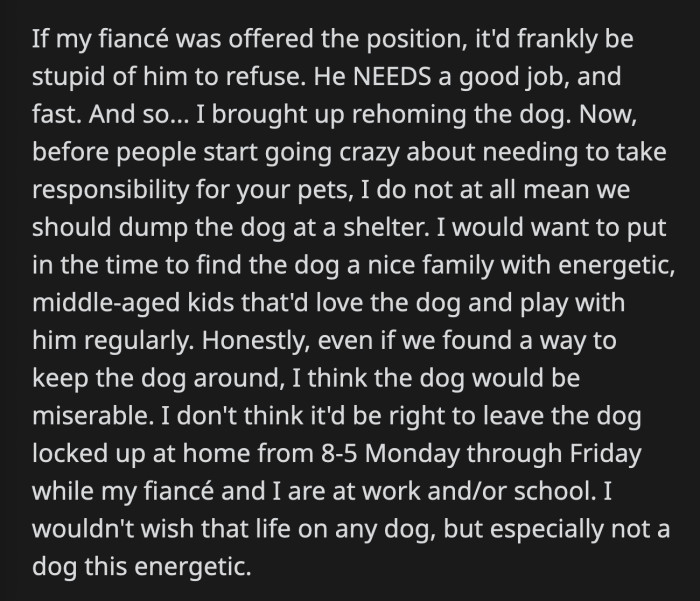
He got mad when OP brought up rehoming his dog and said it's not on the table. OP disagrees and thinks this is their best path moving forward, and it would be better for the dog as well.
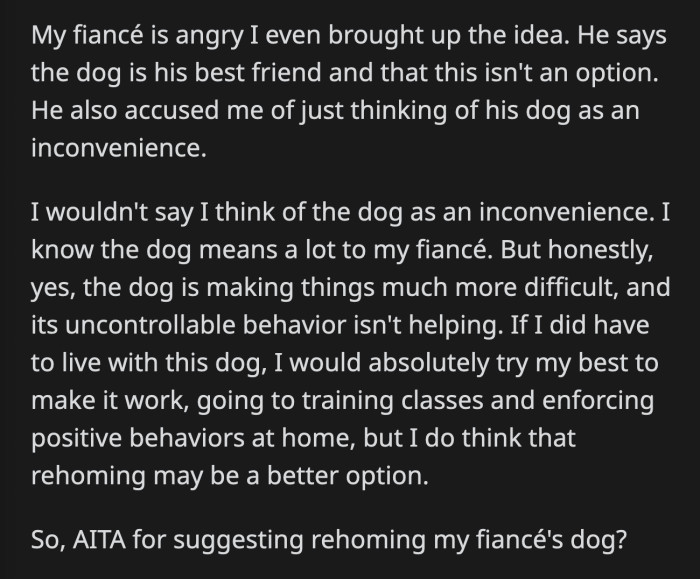
The most voted comment sided with OP's boyfriend. They said OP should look into her controlling tendencies instead of worrying about a dog she doesn't even live with yet.
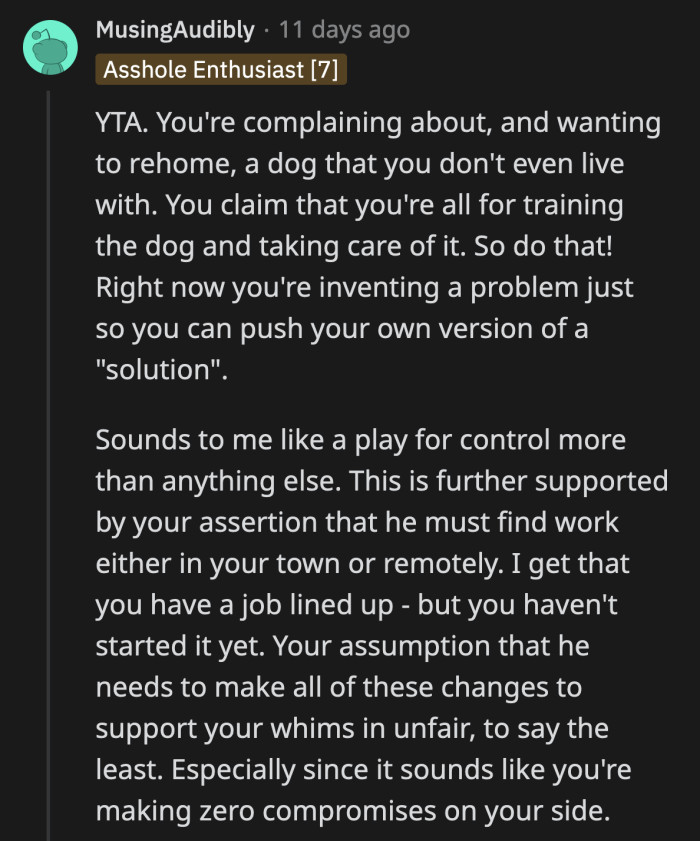
From a psychological standpoint, the emotional attachment to pets often transcends mere companionship; it can symbolize deeper emotional needs and relational security. A licensed psychologist emphasizes that pets often become part of the family unit, and disagreements about their care may elicit feelings of betrayal or abandonment when one partner feels unsupported.
Understanding the emotional weight of such decisions is crucial for navigating the complexities of relationship dynamics.
From a developmental perspective, the attachment one has to pets can also stem from childhood experiences. A study from the University of Michigan found that individuals who had secure attachments to pets often replicate those dynamics in their adult relationships. Thus, the fight over rehoming a dog may not just be about the animal itself, but also about how partners view commitment and care.
Understanding these emotional ties can help couples navigate their disagreements more effectively.
OP said she has always been transparent about wanting to stay in her town, and her boyfriend has known about it since then. She also clarified that she only brought up rehoming the dog, but she won't force him to follow through.
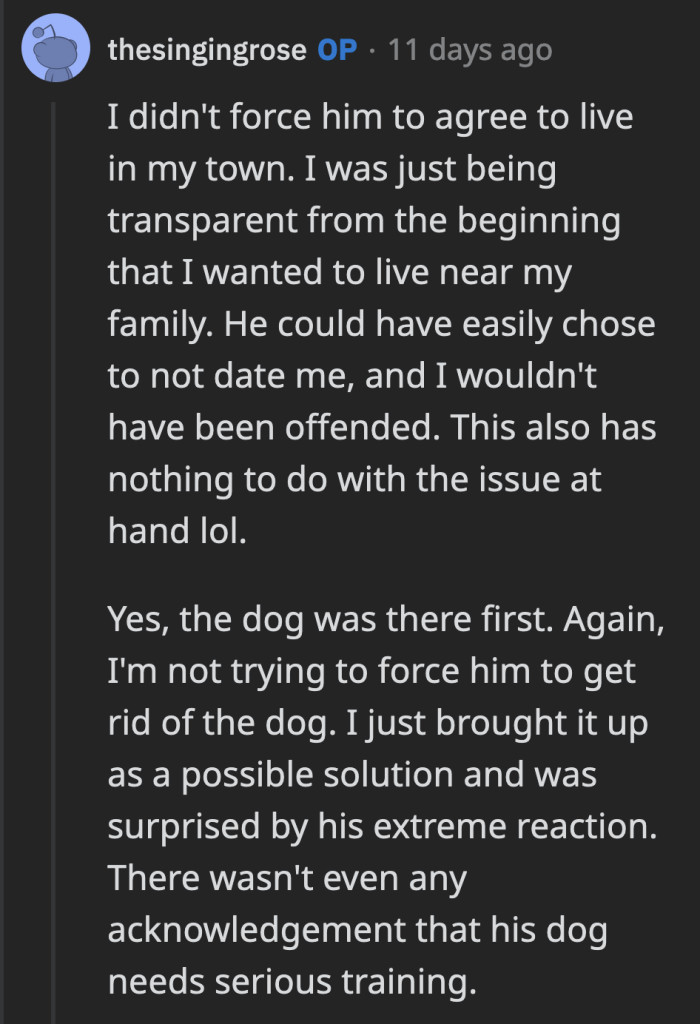
Most commenters wanted more information and started by asking OP about the dog's breed

OP said he is a mixed-breed dog and that her fiancé doesn't really spend a lot of time with his dog to keep it from being bored
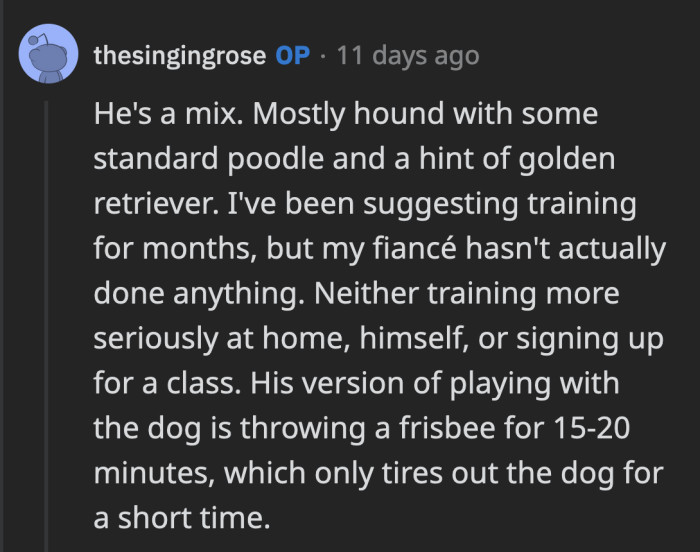
The Importance of Shared Values
Shared values are foundational to relationship satisfaction, and conflicts around pet ownership can highlight discrepancies in these values. Research indicates that couples who engage in discussions about their future aspirations and lifestyle choices tend to experience higher levels of relationship satisfaction.
In this case, discussing the implications of rehoming the dog in the context of long-term goals can help both partners clarify their priorities and negotiate a solution that aligns with their shared vision.
The Need for Compromise
Compromise is essential in relationships, especially when dealing with sensitive topics like pet ownership. Research published in the Journal of Family Psychology emphasizes that successful resolution of conflicts often hinges on each partner's willingness to find middle ground. In the context of rehoming a pet, both partners may need to explore what they can agree on regarding the dog's care and future.
By discussing their feelings openly and seeking a mutually agreeable solution, couples can navigate these emotionally charged situations more effectively.
Have they tried training classes for the dog, one commenter asked

OP said she has been suggesting this very solution to her fiancé, but he basically shrugged her off. She also can't train him because she doesn't live with the dog.

It's time to face reality, and the sooner that happens, the better it is for OP

Furthermore, exploring the reasons behind the desire to rehome a pet can provide valuable insights into the relationship's dynamics. For instance, if the fiancé views the dog as a burden rather than a companion, it might reflect broader feelings of being overwhelmed or disconnected in the relationship. A study from the Journal of Clinical Psychology highlights that individuals who feel unsupported in relationships are more likely to view other commitments, such as pets, as burdensome.
Addressing these feelings is crucial for fostering deeper emotional connection and understanding.
In practical terms, couples could benefit from taking time to reflect on their values regarding pet ownership before making decisions. Engaging in structured discussions, perhaps facilitated by a therapist, can help partners articulate their feelings and needs. This aligns with the principles of nonviolent communication, which emphasize empathy and understanding in resolving conflicts.
By prioritizing each other’s emotional needs, couples can create a more supportive environment for addressing sensitive issues.
He would be more preoccupied with other things once he gets a job; the situation won't improve for the dog or OP by then
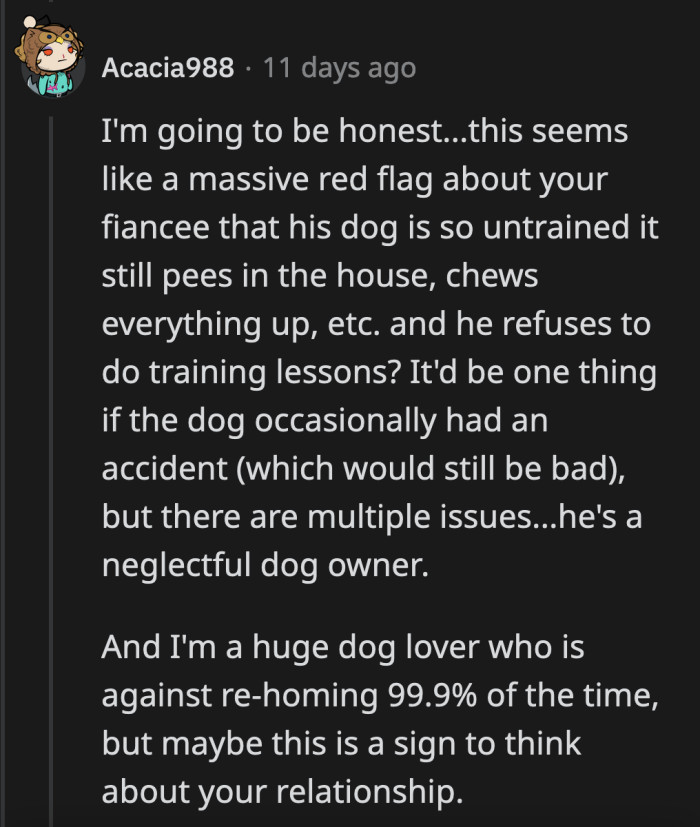
I don't think OP is at that stage yet; she has merely suggested rehoming the dog, but she can't actually start the process unless her fiancé consents to it

OP said if her fiancé agrees to rehome his dog, she would go the extra mile to make sure that the dog ends up with a good family
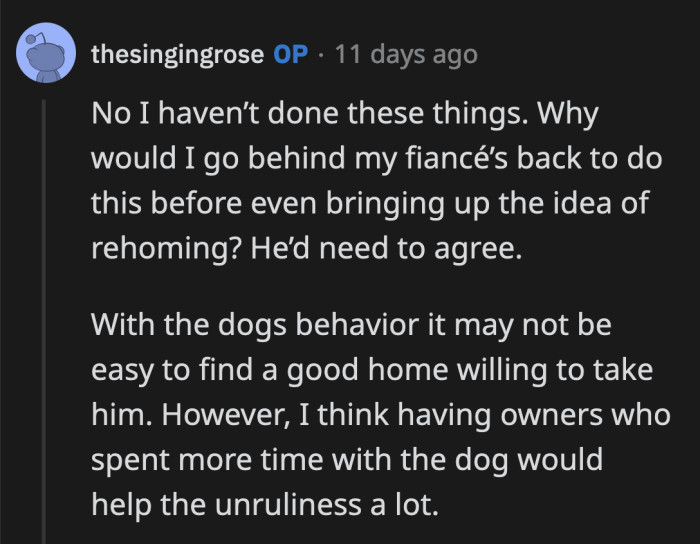
Strategies for Conflict Resolution
To navigate such conflicts effectively, couples can benefit from employing conflict resolution strategies that prioritize empathy and understanding. Research in conflict resolution emphasizes the importance of active listening and creating a safe space for each partner to express their feelings without judgment.
Techniques like using 'I' statements can help communicate feelings about the situation without assigning blame, thereby fostering a more constructive dialogue.
Moreover, exploring compromise solutions that acknowledge both partners’ needs can lead to a more harmonious outcome.
Long-Term Implications of Disagreement
Disagreements over pets can foreshadow larger issues in a relationship, especially if one partner feels their voice is consistently undervalued. Research from the University of California, Berkeley, indicates that unresolved conflicts can lead to emotional distance over time. It’s crucial for couples to recognize the importance of addressing such conflicts early on to prevent resentment from building.
Being proactive in discussing feelings about pet ownership can help partners build a stronger foundation for their relationship, ensuring that both partners feel heard and valued.
It's pretty obvious that OP does the heavy lifting in this relationship

She is slowly realizing that the problem in the relationship is not really the dog
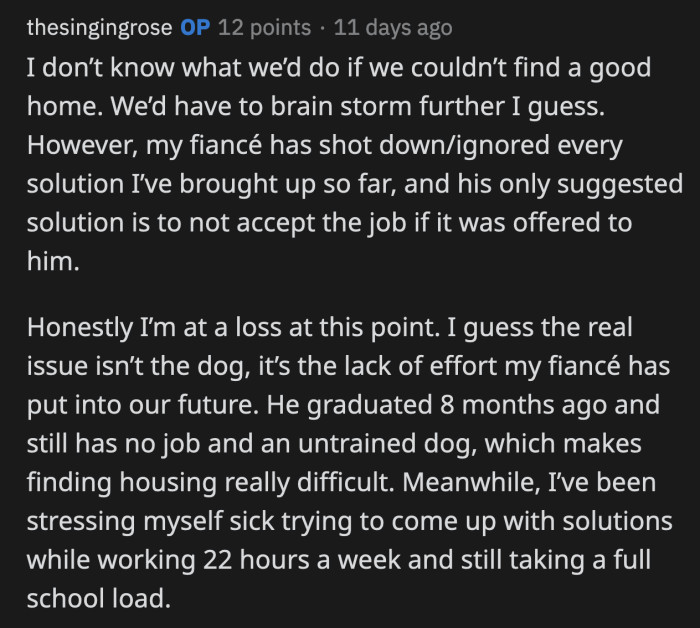
A harsh commenter said they would rather rehome OP than the dog if they were in the fiancé's shoes
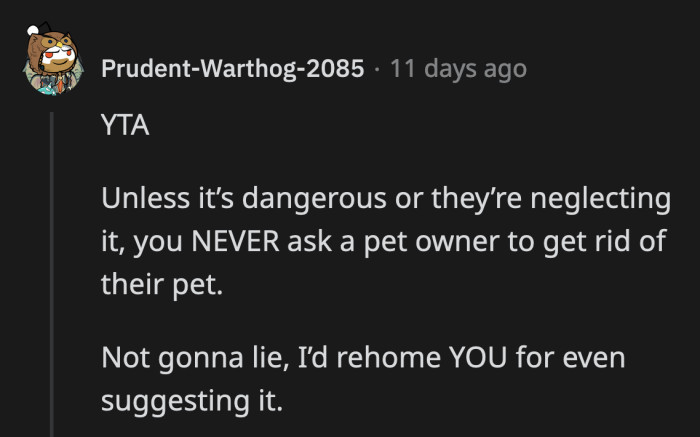
OP, this comment is very telling of what you really think. OP already knows what she has to do; it's just a matter of accepting it.
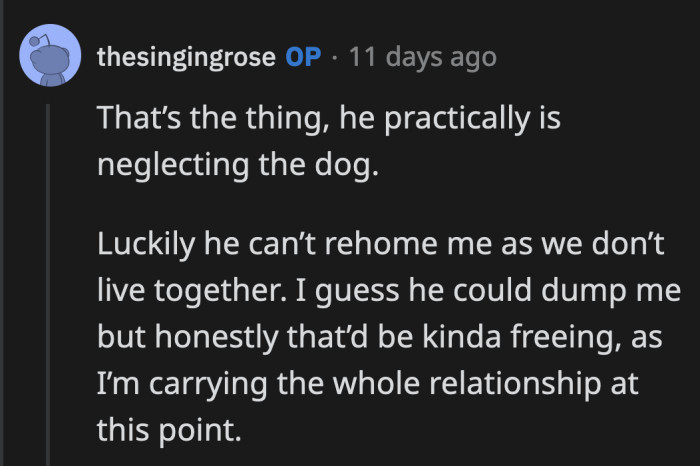
The dog isn't getting enough attention as it is; OP is not making up a scenario that's far from their current reality. It's where things are likely headed, and she is not wrong.
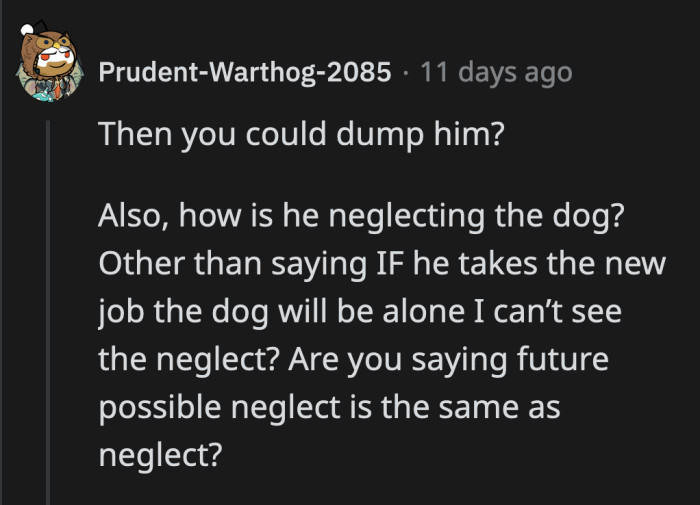
It looks like OP is not ready to break things off just yet until her fiancé proves unwilling to change his ways
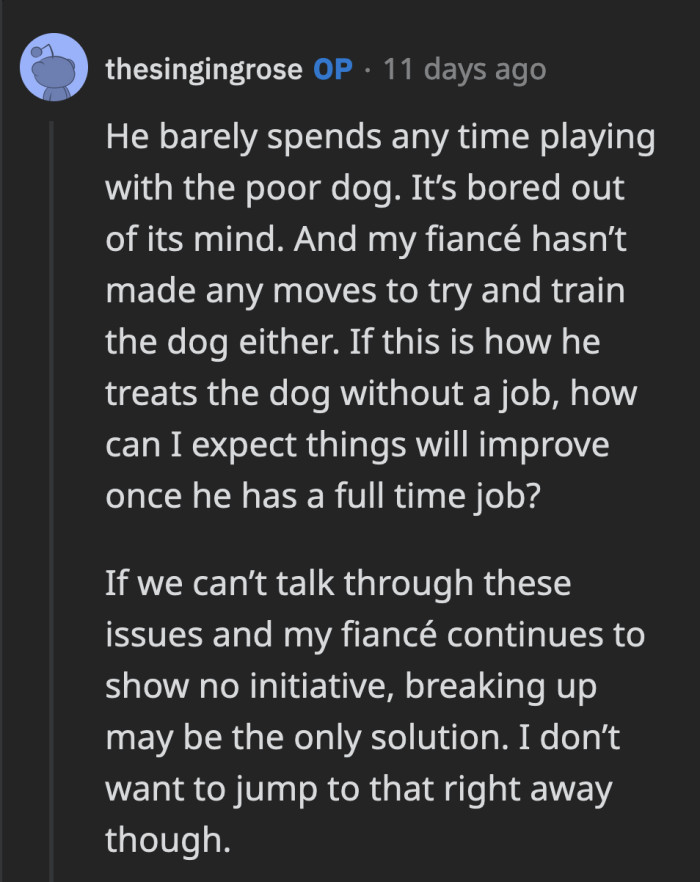
A marriage is harder to undo, is what the redditors are pointing out
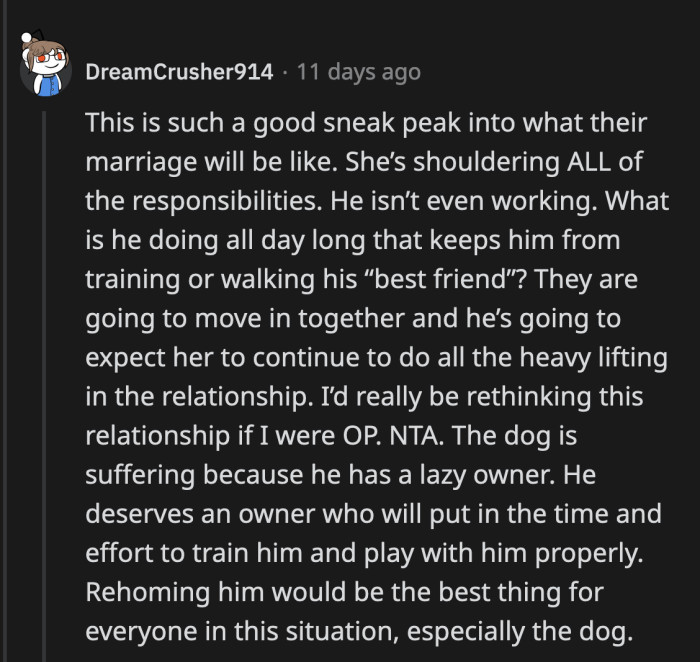
As a dog owner, rehoming a pet is an impossible task. However, in certain situations, it is the only and best option for the animal.
In this case, the dog is better off with another owner who can dedicate their time to making sure the dog has a fulfilling life. That owner is certainly not OP's fiancé.
The biggest issue in this relationship is not the bored dog; it's OP's fiancé. It's obvious that their goals do not align, and OP is too young to settle for this kind of relationship.
Psychological Analysis
This conflict highlights the importance of understanding each partner's emotional attachments and values. It’s not uncommon for disagreements about pets to reflect deeper issues in the relationship.
Engaging in open discussions about feelings and expectations can facilitate better understanding and help couples navigate challenges together.
Analysis generated by AI
Analysis & Alternative Approaches
Ultimately, navigating conflicts about pet ownership requires open communication and a willingness to compromise. Understanding the emotional significance of pets can enhance empathy between partners and foster deeper connections.
As noted in various psychological studies, addressing underlying values and needs is essential for building a resilient and supportive partnership.
Analysis & Alternative Approaches
In conclusion, conflicts over pet ownership can serve as a lens through which to examine deeper relational issues. By fostering open communication and exploring shared values, couples can navigate these challenges in ways that strengthen their relationship.
Ultimately, addressing the emotional nuances surrounding these decisions can lead to greater understanding and intimacy.



